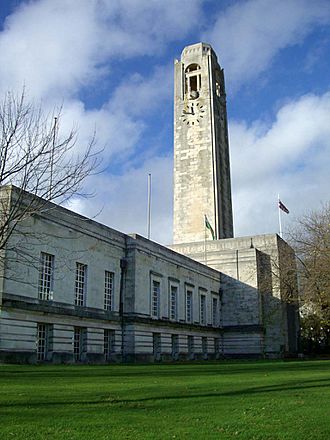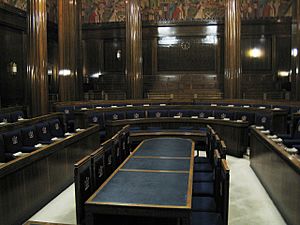Swansea Guildhall facts for kids
Quick facts for kids Guildhall |
|
|---|---|
|
Guildhall Abertawe
|
|

Swansea guildhall c.2006
|
|
| General information | |
| Location | Swansea, Wales |
| Address | Swansea SA1 4PE |
| Coordinates | 51°36′51.00″N 3°57′37.00″W / 51.6141667°N 3.9602778°W |
| Construction started | 1932 |
| Completed | 1934 |
| Inaugurated | 23 October 1934 |
| Cost | £300,000 |
| Owner | City and County of Swansea Council |
| Height | 48 metres (clock tower) |
| Design and construction | |
| Architect | Sir Percy Thomas |
| Main contractor | Messrs. E Turner & Sons Ltd |
| References | |
|
Listed Building – Grade I
|
|
| Official name: Swansea Guildhall | |
| Designated: | 25 July 1994 |
| Reference #: | 14594 |
The Guildhall (which is Guildhall Abertawe in Welsh) is a very important building in Swansea, Wales. It's one of the main places where the City and County of Swansea Council has its offices. The Guildhall is actually a group of buildings. It includes the City Hall, a concert hall called Brangwyn Hall, and the Law Courts for Swansea. This whole complex is a special "Grade I listed building," which means it's considered very important historically and architecturally.
Contents
History of the Guildhall
The Guildhall was built to replace an older building that served the same purpose. The spot chosen for the new Guildhall was once part of Victoria Park. Work on the building began on May 4, 1932, when the first stone was laid.
Who Designed the Guildhall?
The building was designed by a famous architect named Sir Percy Thomas. He designed it in a style called "neoclassical," which means it looks like old Greek and Roman buildings. Some people also describe its style as "Stripped Classicism." The Guildhall was officially opened on October 23, 1934, by The Duke of Kent.
Cool Features of the Building
Sir Percy Thomas planned for the Guildhall to be made of white Portland stone. One of its most famous parts is its 48 metres (157 ft) tall clock-tower. This tower has an art deco style, which was popular at the time. It's a real landmark in Swansea!
Look closely at the clock-tower, and you'll see something interesting. It has the front part (or "prow") of a Viking longship sticking out on each side. This is a reminder of Sweyn Forkbeard, a Viking leader who some believe founded Swansea. Inside the building, the council chamber, where important meetings happen, has walls made of beautiful Australian walnut wood. It also has tall columns that are 22 feet (6.7 m) high.
Sir Percy Thomas won a special award, the Bronze Medal for Architecture, in 1935 for his amazing work on the Guildhall.
Surviving Tough Times
Even though the Guildhall is a big building that could be easily seen from the air, it was not damaged during the Swansea Blitz in February 1941. This was a time during the Second World War when Swansea was heavily bombed.
A Royal Announcement
On July 3, 1969, something very special happened at the Guildhall. The Prince of Wales (who is now King Charles III) came in person to announce that Swansea would officially become a city!
Home to Courts and Falcons
For many years, part of the Guildhall was used as a courthouse. These courts handled important legal cases. Later, in 1988, the main court hearings moved to a new, special courthouse in St Helen's Road.
In the 1980s, something cool happened on the Guildhall's clock-tower. The first recorded pair of peregrine falcons (a type of bird) to nest in a city in the UK were seen living there!
The Guildhall Today
For most of the 1900s, the Guildhall was the main meeting place for the Swansea City Council. However, in 1996, the council moved its main meetings to the Swansea Civic Centre. Today, the Guildhall still holds the city's law courts and many of the council's offices. The big clock on the tower was last checked and fixed in 2019 to make sure it keeps perfect time.
Images for kids
 | Claudette Colvin |
 | Myrlie Evers-Williams |
 | Alberta Odell Jones |




